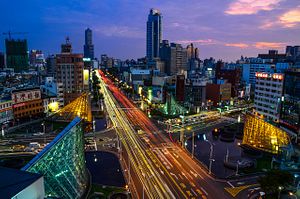Taiwan’s Democratic Progressive Party (DPP) dealt a finishing blow to the opposition Kuomintang’s (KMT) brief control of the southern city of Kaohsiung as its candidate, Chen Chi-mai, won a commanding victory in a by-election held Saturday.
The result returns Kaohsiung, a traditional DPP stronghold, to the ruling party and has left the opposition KMT searching for fresh answers after former mayor Han Kuo-yu, who defeated Chen in 2018 to end 20 years of DPP rule in the city, was removed from office through a historic recall vote in June.
Chen received over 70 percent of the vote to defeat KMT candidate Jane Lee, who had been plagued by a plagiarism scandal, and Wu Yi-jheng of the Taiwan People’s Party.
Saturday’s result was never in question. Kaohsiung voters booted Han from the mayor post in June after being angered by the Beijing-friendly mayor’s decision to run for president just months after assuming office, along with his failure to keep a series of grandiose campaign promises.
Chen had lost to Han’s insurgent 2018 campaign amid a sentiment that the DPP, despite being the favored party of most Kaohsiung residents, had become complacent in governing the city. The campaign wasn’t helped by Chen’s failure to connect with voters and counter Han’s bombastic personality.
But Han voters quickly felt regret as the new mayor seemed more interested in his growing national profile than governing Kaohsiung.
Chen, meanwhile, rehabilitated his image by graciously accepting defeat and making well-received attempts to connect with voters. He was appointed vice premier in January 2019 under then-newly minted Premier Su Tseng-chang. The pair became popular for a down-to-earth approach to explaining policy and listening to the concerns of constituents, especially as Taiwan responded to the COVID-19 pandemic.
The victory concludes a national renaissance for the DPP that seemed unthinkable after the party’s heavy losses in 2018 regional elections. The tides changed months later as President Tsai Ing-wen recovered from a dip in popularity and won over voters by vowing to protect Taiwan’s sovereignty from Chinese aggression and vocally supporting Hong Kong’s pro-democracy protests in 2019.
Meanwhile, Han’s promises to enrich Kaohsiung by pursuing trade deals with foreign countries, including China, grew stale as he floundered in countering Tsai’s message of defending Taiwan’s democracy with a sharp presidential campaign of his own.
The “Han wave,” a phenomenon of rabid popularity that saw the mayor followed religiously by staunch supporters and KMT-leaning TV and media outlets in early 2019, subsequently began to die out before seemingly ending with a whimper.
KMT leaders had banked on Han supporters buoying the party’s future prospects, even after his loss in January’s presidential election.
Han had brought voters to the KMT from outside the party. His supporters skew older and, fueled by fond memories of Taiwan’s 1980s economic boom under KMT leader Chiang Ching-kuo, prioritize trade with China over the DPP’s messages of sovereignty and subtle paeans to the idea of an eventual independent Taiwan.
The infusion of these voters has left the KMT in the past few months awkwardly deciding on a new message, as voices within the party have emphasized the need to connect with young voters and deviate from the party’s increasingly unpopular warmth toward Beijing.
Johnny Chiang, who was elected KMT chair after Han’s presidential defeat, initially promised to scrap the “1992 consensus” – an alleged agreement between Taipei and Beijing that both sides agree there is “one China” but disagree on what that means.
The consensus has always been rejected by the DPP and faced new scrutiny after Chinese leader Xi Jinping in January 2019 equated the consensus with a “one country, two systems” model of governance, something the overwhelming majority of Taiwanese voters find unacceptable.
Lin Wei-chou, the KMT caucus whip, said Saturday the KMT should no longer see Han and the “Han wave” as its savior, leading to an internal debate within the party that went public as other KMT leaders insisted the party must value all its members.
Meanwhile, Chen will become Kaohsiung’s mayor after losing in 2018 and previously briefly serving as interim mayor of the city in 2005. He will be up for reelection in 2022 during regularly scheduled mayoral elections throughout Taiwan.
































